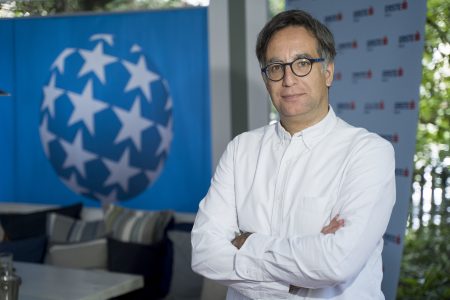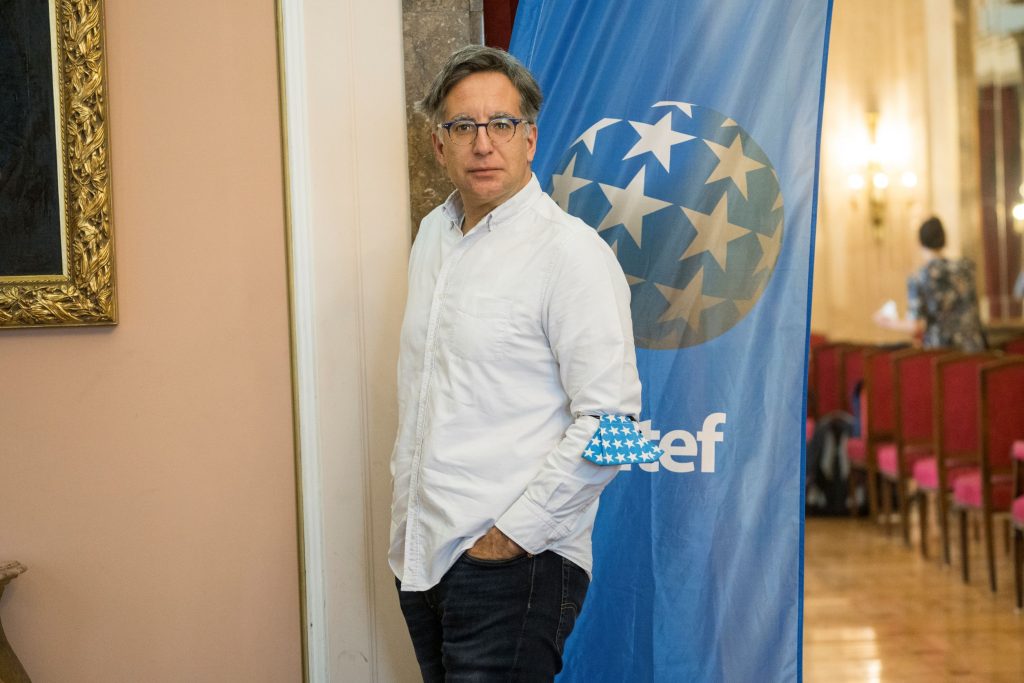“A Belgian play choreographed by an Iranian. Out of four Serbian plays, one is directed by a German of Turkish origin, one by a Slovene, and one by a Serbian director who lives and works in Germany. A Serbian choreographer stages a play produced by Germans, while a choreographer of Mexican-Chilean origin choreographs a play is produced by an Austrian.”
This September, the 54th and 55th Belgrade International Theatre Festival, popularly known as Bitef, will be held together to make up for the last year of pandemic, when only the Festival’s prologue was held, heralding this year’s festival.
Our interlocutor Ivan Medenica, PhD, the artistic director of Bitef, chose fourteen plays from nine countries for the main festival programme. The festival’s title – “On the Edge of the Future” – which unites all performances rests on two topics of this year’s Bitef – the environmental problems of today and the world without human beings, both topics dominating our present time.

Preparing and organizing a festival like Bitef is, without a doubt, an extremely complicated endeavour even in a time not rife with pandemic disease. How did you overcame all obstacles and brought 14 plays from nine countries to Belgrade?
Maybe my answer will come as a surprise to you. Preparing the 54th and 55th Bitef, two festival editions at the same time, because we skipped the festival last year, was only somewhat difficult in regular circumstances. In some respects, my job was easier than usual. The biggest aggravating circumstance was that we waited longer than usual for foreign theatre troupes to confirm they’re coming. We also had cancellations, because they had to coordinate new performances with the ones already booked, which did not take place due to the pandemic.
“The performer on stage interacting with the audience has always been the essence of theatre and nobody questions that”
A mitigating circumstance is that part of this double programme was created last year when we devised the main production prerequisites for the guest appearances of these troupes. However, the most important mitigating circumstance is that most of the theatres we contacted could hardly wait to resume international performances. The reason is the primordial need for exchange, dialogue of cultures, as well as economic motives which should not be neglected. Many foreign theatres, especially independent ones, earn money from guest appearances. It was interesting for us to notice that these companies entered into negotiations much faster and more efficiently than, say, institutional, subsidized and very wealthy theatres in the German-speaking area. The latter was surprisingly lazy during the pandemic because they did not have to fight for survival.
The topics and the title of this year’s Bitef were selected last year and considering everyday life, they have become even more current now.
The thematic and artistic line of this Bitef, as well as its title „On the Edge of the Future“, were chosen last year, when the festival, due to a pandemic, could not be staged in full capacity. The thematic line draws an arc from the ecological crisis to posthumanism understood as a critique of the anthropocentric world. Climate change, global warming, ecosystem collapse and nature pollution are some of the most pressing global issues in the world we live in. They are also very relevant locally if we keep in mind the ecological revolution initiated in our society following the construction of mini-hydropower plants, ecologically non-transparent investments of foreign companies such as Rio Tinto, water legislation, etc. You are right when you say that the environmental problems have become even more relevant this year. Conspiracy theories aside, the Covid-19 pandemic is also the result of disturbed ecological balance and the destruction of the habitats of some animal species.
You have chosen four plays from Serbia, which speaks volumes of the quality of the local theatre. You especially highlighted the production of the Belgrade Drama Theatre. Why so?
I have repeatedly pointed out that the season behind us, despite the impossible conditions in which it was prepared and held was aesthetically Bitef-like, to a surprising extent. This means that there were several performances of contemporary stage poetics that stood out on the institutional stage, rather than the independent one, as one probably expects, which ranged from a very radical actualization of the classics (“Kaspar”) to hybrid forms in which drama theatre permeates through or contemporary dance (“Cement Beograd”) or, those in the form of installations that use artificial intelligence, featuring visual arts (“Kao da kraj nije sasvim blizu”). Furthermore, theatre directors, who had their international promotion for the first time at Bitef, like Ersan Mondtag, Sebastian Horvat, Tomi Janežič, Boris Liješević, Miloš Lolić and Maja Pelević – worked last season in Belgrade theatres, and especially the Belgrade Drama Theatre, more than ever before. We must take care of our children even when they are all grown up. This season breaks the prejudice that Bitef does not influence the domestic theatre scene. Time will tell whether this influence is tectonic, a Bitef-like turn of events or a transient phenomenon.
Several performances are the result of the co-production of theatres from different countries. Could this be a solution against the proverbial lack of money in Serbia?
Yes, this has been an increasingly present tendency in theatres worldwide over the years, especially when it comes to plays made by international festivals, or with the basic goal of being performed at them. The situation is a bit different with performances of institutional, subsidized theatres, although they are also increasingly starting to embark on co-productions. You are right when you say that the main reason is financial, hence it looks like a production format that can resolve the lack of money, which we fear will be even greater after the pandemic. However, this also facilitates dialogue between theatre cultures, which is also very important.
“The audience’s return to theatres is a signal of the renewal of social life, that is, a return to normalcy”
I find it entertaining when, during my media appearances, I start listing the countries that have sent their plays to Bitef, as if I am talking about the Olympics. And yet, very few of those plays have one origin, which is, of course, excellent. Just look at the ‘statistics’ this year – a Belgian play choreographed by an Iranian. Out of four Serbian plays, one is directed by a German of Turkish origin, one by a Slovene and one by a Serbian director who lives and works in Germany. A Serbian choreographer stages a play produced by Germans, while a choreographer of Mexican-Chilean origin choreographs a play which is produced by an Austrian.
We are used to seeing the latest play from the world stage at Bitef. Judging by the media, artificial intelligence being portrayed one stage is all the rage this year. What is this really about?
It may be the most attractive, but it will not absolutely dominate. Regarding technological means and approaches, there will be one show in which artificial intelligence plays a significant role, one in which the dancers are accompanied by a drone, one in which a robot is the main, but not the only performer, and one made for an online platform, specifically Zoom, and which exists, at least for viewers, only in virtual space. These performances are part of the aesthetic axis of this year’s Bitef, where the notion of posthumanism, understood as a critique of the anthropocentric world, is used to problematize the live presence of performers and their exchange with the audience. In addition to the aforementioned influence of technology, this problematization will be realized in classical ways, for example with visual effects on stage that disintegrate the performing body. Of course, this is a re-examination of an aesthetic phenomenon – the performer on stage interacting with the audience has always been the essence of theatre and nobody questions that.

Knock wood but, as things are at the moment, it seems that Bitef will be live. This decision is healing in the sense that it awakens the hope of an imminent return to the pre-pandemic normalcy.
As I said earlier, the physical, energetic, effective, and mental exchange between performers and spectators in a shared physical space is the aesthetic essence of theatrical art. Therefore, no media mediation, streams, recordings and the like can be identical to a real theatrical experience. That is why returning to live performance means the resurrection of the theatre, and, logically, all its fans rejoice in it. Furthermore, the audience’s return to theatres is a signal of the renewal of social life, that is, a return to normalcy. Taking all that into consideration, we hope that 54th/55th Bitef will be held live, as planned, but we do also have alternative plans in place.
As usual, you will start preparing the next Bitef before this year even starts. Will the next festival theme be about the consequences of a pandemic?
Yes, the topic should be one of the most severe consequences of the pandemic that some groups have already felt, and I think we will all soon begin to feel it too – that is the working conditions, job loss, exploitation at work, the professions that are in particular jeopardy because of the pandemic, etc.
By Sonja Ćirić